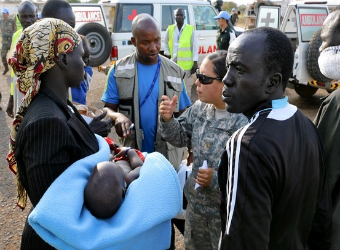The U.S. military on Sunday rushed to evacuate American citizens from a rebel-held town in South Sudan, the latest sign that a country the U.S. helped create might be spiraling toward civil war.
About 15 Americans were evacuated on Sunday from the town of Bor in helicopters, according to a State Department spokeswoman. The flights were part of a broader exodus of international workers and South Sudanese from fighting between factions of South Sudan’s army. The U.S. has evacuated about 380 U.S. officials and private citizens, said the spokeswoman, Jen Psaki.
A political power struggle between former South Sudanese Vice President Riek Machar and President Salva Kiir ahead of 2015 elections appears to have set off the violence. It quickly descended into ethnic clashes that risk splitting the country of 10 million.
By Sunday, rebel factions allied with Mr. Machar, a member of the Nuer ethnic group, had solidified control of territory they seized in a week of gunbattles with government forces that have left 500 dead, according to figures provided by South Sudan’s military, other officials and the U.N.
Mr. Kiir, from the largest ethnic group, the Dinka, said last week that his former deputy and rival for the presidency had attempted a coup and been beaten back. Mr. Machar denied an attempt to overthrow Mr. Kiir but then said it was time for Mr. Kiir to go.
The dispute quickly widened to Bor, the capital of South Sudan’s largest state, on Wednesday, and two U.N. peacekeepers and 20 civilians were killed Thursday when armed men overran a U.N. camp in another part of Jonglei state.
The rebels allied with Mr. Machar have taken two state capitals and the area surrounding them, defying diplomatic attempts to broker a cease-fire and initiate peace talks. The U.N. has reported fighting in six of the country’s 10 states.
The violence offered a cautionary lesson for foreign powers that attempted to forge a new African nation in a fractured region where alliances often are short-lived and ethnic divisions run deep.
The U.S. lobbied hard for the creation of South Sudan as part of a drive to help rebel groups get out from under the thumb of the government of Sudan, their erstwhile civil-war
The U.S. has pumped about $300 million a year into South Sudan since its independence in 2011. China and India have invested heavily in its oil fields, betting that a stable peace with its northern neighbor could turn the new country into a major energy supplier for the two Asian giants.
Until a week ago, the resulting republic was relatively peaceful, if economically stagnant. But then clashes between units of the presidential guard in the capital escalated into fighting throughout Juba, the capital, much of it ethnic groups targeting each other.
On Sunday, droves of refugees were on the move, seeking the relative safety of U.N. camps inside South Sudan or crossing borders into Kenya and Uganda.
About 42,000 people have taken shelter in the U.N. camps, the organization said, the bulk of about 60,000 displaced by the surge of violence.
The U.N. said it was getting increasingly difficult to provide for them because it is running short on resources and staff. It reported looting at humanitarian compounds in the states of Jonglei and Unity, the two regions largely out of government control.
In Unity, a key oil-producing state, officials said the government was no longer operating there and they were staying home. One official said military units that had defected were patrolling the streets of Bentiu, the state capital.
The U.N. mission in the country began evacuating noncritical staff to Uganda the day after one of its helicopters was shot down. No one was injured in the crash, U.N. spokesman Joe Contreras said.
A group of U.S. military planes took fire on Saturday while trying to land at rebel-held Bor to evacuate Americans. Four U.S. service members were wounded by the gunfire and that mission was aborted. A U.S. official has said there was a miscommunication over the flight, and not all those on the ground had been told the planes were coming.
Possibly as a security precaution, some craft used in Sunday’s evacuation were civilian with no military markings. In flights taking Americans and foreign nationals from the U.N. mission in Bor to Juba, a combination of MI-17 helicopters operated by the U.N. and civilian helicopters contracted by the U.S. military were used, a senior U.S. defense official said.
On Saturday, Secretary of State John Kerry spoke to Mr. Kiir, the South Sudanese president, by phone and “made clear that continued violence endangers the vision set forth at the time of South Sudan’s independence,” the State Department said.
The U.S. envoy to Sudan and South Sudan, Donald Booth, was on his way to Juba to try to help an East African delegation broker peace talks.
Mr. Booth is expected to work along with East African mediators already on the ground and regional power brokers to bring the rivals together for talks.
Mr. Kiir has said he is ready for unconditional talks. Mr. Machar, whose whereabouts were unknown, has said in media interviews he will participate only once his compatriots are released. The South Sudanese government has arrested 11 of his allies in the capital.
In a statement apparently directed at rebel leader Mr. Machar, the White House warned: “Any effort to seize power through the use of military force will result in the end of long-standing support from the United States and the international community.”
Source: Wall Street Journal
